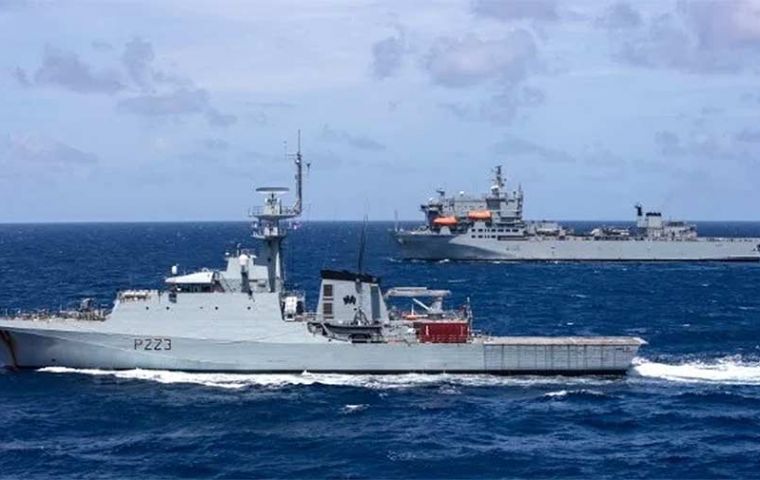MercoPress. South Atlantic News Agency
Royal Navy and US Coast Guard will work together in areas of strategic interest
 Royal Navy and USCG will work more closely in areas such as the Caribbean, Gulf of Guinea, Mediterranean, East Africa and the Indo-Asia Pacific.
Royal Navy and USCG will work more closely in areas such as the Caribbean, Gulf of Guinea, Mediterranean, East Africa and the Indo-Asia Pacific. The Royal Navy has announced it will work more closely with the and US Coast Guard to fight crime and protect the planet. The two services already combine to stop drugs traffickers in the Caribbean and Middle East, assist each other with operations in the polar regions, run exchange programs for sailors and frequently work and train side-by-side around the globe.
Now they’ve signed a ‘statement of intent’ to expand their combined commitments, working in tandem in four key areas: forward presence, maritime domain awareness, operations in the High North/icy waters and personnel exchange programs.
The next-level co-operation will see Royal Navy and USCG ships work more closely in areas of strategic interest – such as the Caribbean, Gulf of Guinea, Mediterranean, East Africa and the Indo-Asia Pacific.
These are regions where the Royal Navy’s modern patrol ships are permanently operating, with HMS Trent focused on the Mediterranean and Gulf of Guinea, HMS Medway working in the Caribbean and HMS Tamar and Spey deployed across a vast area, from the eastern shores of Africa to the west coast of the USA.
The new agreement could pave the way to more USCG Law Enforcement Detachments (LEDETs) deploying on Royal Navy ships, which have previously had successful deployments in the Caribbean with RFA Wave Knight and RFA Argus, resulting in millions of pounds worth of drugs seized.
In the Arctic, the USCG and Royal Navy will also conduct more joint training in ice-covered waters to ensure sailors are kept highly trained and experienced in ice operations and ship handling.
This builds on the work two Royal Navy officers – Lieutenants Jacob Stein and Max Friswell – from HMS Protector did while in the Alaskan Arctic aboard USCG cutter Polar Star last February.
It led to USCG ice-breaking expert Lieutenant Lauren Kowalski deploying with Protector as the polar exploration ship patrolled the Arctic for the first time.
Two officers from Protector – Lieutenants Charlotte Eddy and Alastair Newton – later sailed the fabled Northwest Passage with the USCG’s largest and most advanced icebreaker, the cutter Healy, in November to hone their ice skills ready to take their ship back to the Antarctic.
There are also plans to build on already successful exchange programs, which allows USCG engineers to work with the Royal Navy but will soon also allow pilots and aircrew to do the same.




Top Comments
Disclaimer & comment rulesCommenting for this story is now closed.
If you have a Facebook account, become a fan and comment on our Facebook Page!